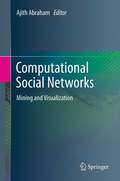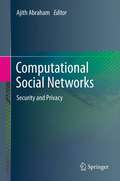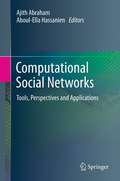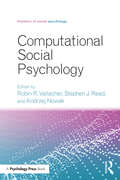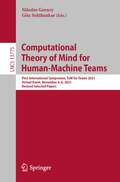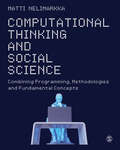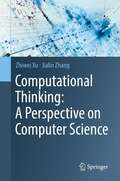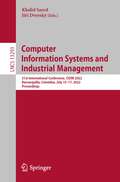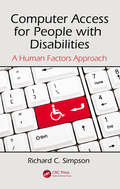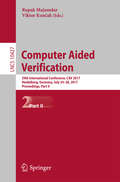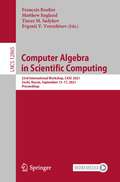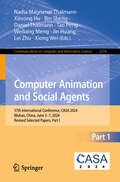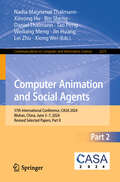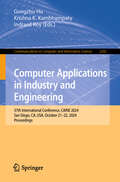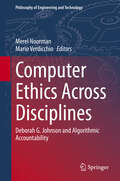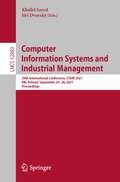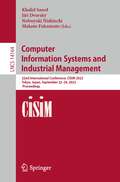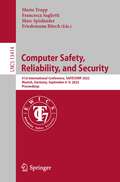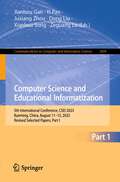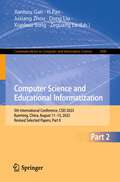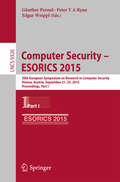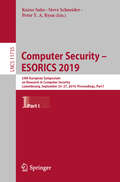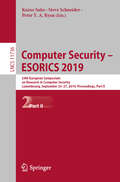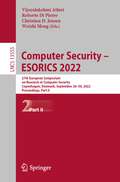- Table View
- List View
Computational Social Networks: Mining and Visualization
by Ajith AbrahamThis book is the third of three volumes that illustrate the concept of social networks from a computational point of view. The book contains contributions from a international selection of world-class experts, with a specific focus on knowledge discovery and visualization of complex networks (the other two volumes review Tools, Perspectives, and Applications, and Security and Privacy in CSNs). Topics and features: presents the latest advances in CSNs, and illustrates how organizations can gain a competitive advantage from a better understanding of complex social networks; discusses the design and use of a wide range of computational tools and software for social network analysis; describes simulations of social networks, and the representation and analysis of social networks, highlighting methods for the data mining of CSNs; provides experience reports, survey articles, and intelligence techniques and theories relating to specific problems in network technology.
Computational Social Networks: Security and Privacy
by Ajith AbrahamThis book is the second of three volumes that illustrate the concept of social networks from a computational point of view. The book contains contributions from a international selection of world-class experts, concentrating on topics relating to security and privacy (the other two volumes review Tools, Perspectives, and Applications, and Mining and Visualization in CSNs). Topics and features: presents the latest advances in security and privacy issues in CSNs, and illustrates how both organizations and individuals can be protected from real-world threats; discusses the design and use of a wide range of computational tools and software for social network analysis; describes simulations of social networks, and the representation and analysis of social networks, with a focus on issues of security, privacy, and anonymization; provides experience reports, survey articles, and intelligence techniques and theories relating to specific problems in network technology.
Computational Social Networks: Tools, Perspectives and Applications
by Ajith Abraham Aboul-Ella HassanienThis book is the first of three volumes that illustrate the concept of social networks from a computational point of view. The book contains contributions from a international selection of world-class experts, with a specific focus on practical tools, applications, and open avenues for further research (the other two volumes review issues of Security and Privacy, and Mining and Visualization in CSNs). Topics and features: presents the latest advances in CSNs, and illustrates how organizations can gain a competitive advantage by applying these ideas in real-world scenarios; discusses the design and use of a wide range of computational tools and software for social network analysis; describes simulations of social networks, the representation and analysis of social networks, and the use of semantic networks in knowledge discovery and visualization; provides experience reports, survey articles, and intelligence techniques and theories relating to specific problems in network technology.
Computational Social Psychology (Frontiers of Social Psychology)
by Robin R. Vallacher; Stephen J. Read; Andrzej NowakComputational Social Psychology showcases a new approach to social psychology that enables theorists and researchers to specify social psychological processes in terms of formal rules that can be implemented and tested using the power of high speed computing technology and sophisticated software. This approach allows for previously infeasible investigations of the multi-dimensional nature of human experience as it unfolds in accordance with different temporal patterns on different timescales. In effect, the computational approach represents a rediscovery of the themes and ambitions that launched the field over a century ago. The book brings together social psychologists with varying topical interests who are taking the lead in this redirection of the field. Many present formal models that are implemented in computer simulations to test basic assumptions and investigate the emergence of higher-order properties; others develop models to fit the real-time evolution of people’s inner states, overt behavior, and social interactions. Collectively, the contributions illustrate how the methods and tools of the computational approach can investigate, and transform, the diverse landscape of social psychology.
Computational Theory of Mind for Human-Machine Teams: First International Symposium, ToM for Teams 2021, Virtual Event, November 4–6, 2021, Revised Selected Papers (Lecture Notes in Computer Science #13775)
by Gita Sukthankar Nikolos GurneyThis book constitutes the proceedings of the First International Symposium, ToM for Teams 2021, held in Washington, DC, USA, during November 4–6, 2021, Each chapter in this section tackles a different aspect of AI representing the thoughts and beliefs of human agents. The work presented herein represents our collective efforts to better understand ToM, develop AI with ToM capabilities (ASI), and study how to integrate such systems into human teams.
Computational Thinking and Social Science: Combining Programming, Methodologies and Fundamental Concepts
by Matti NelimarkkaWhilst providing a fundamental understanding of computational social science, this book delves into the tools and techniques used to build familiarity with programming and gain context into how, why and when they are introduced. The overall focus is on helping you understand and design computational social science research, alongside delving into hands-on coding and technical instruction. Key features include: Further reading Exercises accompanied by sample code Programming examples in Scratch, Python and R Key concepts Chapter summaries With experience in course design and teaching, Matti Nelimarkka has a deep understanding of learning techniques within computational social sciences, with the main aim of blending researching, thinking and designing together to gain a grounded foundation for coding, programming, methodologies and key concepts.
Computational Thinking and Social Science: Combining Programming, Methodologies and Fundamental Concepts
by Matti NelimarkkaWhilst providing a fundamental understanding of computational social science, this book delves into the tools and techniques used to build familiarity with programming and gain context into how, why and when they are introduced. The overall focus is on helping you understand and design computational social science research, alongside delving into hands-on coding and technical instruction. Key features include: Further reading Exercises accompanied by sample code Programming examples in Scratch, Python and R Key concepts Chapter summaries With experience in course design and teaching, Matti Nelimarkka has a deep understanding of learning techniques within computational social sciences, with the main aim of blending researching, thinking and designing together to gain a grounded foundation for coding, programming, methodologies and key concepts.
Computational Thinking: A Perspective on Computer Science
by Jialin Zhang Zhiwei XuThis textbook is intended as a textbook for one-semester, introductory computer science courses aimed at undergraduate students from all disciplines. Self-contained and with no prerequisites, it focuses on elementary knowledge and thinking models. The content has been tested in university classrooms for over six years, and has been used in summer schools to train university and high-school teachers on teaching introductory computer science courses using computational thinking. This book introduces computer science from a computational thinking perspective. In computer science the way of thinking is characterized by three external and eight internal features, including automatic execution, bit-accuracy and abstraction. The book is divided into chapters on logic thinking, algorithmic thinking, systems thinking, and network thinking. It also covers societal impact and responsible computing material – from ICT industry to digital economy, from the wonder of exponentiation to wonder of cyberspace, and from code of conduct to best practices for independent work. The book’s structure encourages active, hands-on learning using the pedagogic tool Bloom's taxonomy to create computational solutions to over 200 problems of varying difficulty. Students solve problems using a combination of thought experiment, programming, and written methods. Only 300 lines of code in total are required to solve most programming problems in this book.
Computer Information Systems and Industrial Management: 21st International Conference, CISIM 2022, Barranquilla, Colombia, July 15–17, 2022, Proceedings (Lecture Notes in Computer Science #13293)
by Khalid Saeed Jiří DvorskýThis book constitutes the proceedings of the 21st International Conference on Computer Information Systems and Industrial Management Applications, CISIM 2022, held in Barranquilla, Colombia, in July 2022. The 28 papers presented together with 3 keynotes were carefully reviewed and selected from 68 submissions. The main topics covered by the chapters in this book are biometrics, security systems, multimedia, classification and clustering, and industrial management as well as interesting papers on computer information systems as applied to wireless networks, computer graphics, and intelligent systems.
Computer Access for People with Disabilities: A Human Factors Approach (Rehabilitation Science in Practice Series)
by Richard C. SimpsonIncorporating Compass Computer Access Assessment software, Computer Access for People with Disabilities: A Human Factors Approach provides the information clinicians need to know in order to provide effective alternative computer access solutions to individuals with disabilities. This book presents technology for individuals with physical, cognitive, and sensory impairments, and for older adults. The text covers text entry devices, pointing devices, switch access, automatic speech recognition, and web accessibility. The book draws on research from the fields of rehabilitation engineering, occupational therapy, and human-computer interaction (HCI) and emphasizes fundamental concepts and principles that remain true regardless of which specific operating system or product is being used.
Computer Aided Verification: 29th International Conference, CAV 2017, Heidelberg, Germany, July 24-28, 2017, Proceedings, Part II (Lecture Notes in Computer Science #10427)
by Rupak Majumdar Viktor KunčakThe two-volume set LNCS 10426 and LNCS 10427 constitutes the refereed proceedings of the 29th International Conference on Computer Aided Verification, CAV 2017, held in Heidelberg, Germany, in July 2017. The total of 50 full and 7 short papers presented together with 5 keynotes and tutorials in the proceedings was carefully reviewed and selected from 191 submissions. The CAV conference series is dedicated to the advancement of the theory and practice of computer-aided formal analysis of hardware and software systems. The conference covers the spectrum from theoretical results to concrete applications, with an emphasis on practical verification tools and the algorithms and techniques that are needed for their implementation.
Computer Algebra in Scientific Computing: 23rd International Workshop, CASC 2021, Sochi, Russia, September 13–17, 2021, Proceedings (Lecture Notes in Computer Science #12865)
by Evgenii V. Vorozhtsov Matthew England Timur M. Sadykov François BoulierThis book constitutes the proceedings of the 23rd International Workshop on Computer Algebra in Scientific Computing, CASC 2021, held in Sochi, Russia, in September 2021. The 24 full papers presented together with 1 invited talk were carefully reviewed and selected from 40 submissions. The papers cover theoretical computer algebra and its applications in scientific computing.
Computer Animation and Social Agents: 37th International Conference, CASA 2024, Wuhan, China, June 5–7, 2024, Revised Selected Papers, Part I (Communications in Computer and Information Science #2374)
by Daniel Thalmann Lei Zhu Nadia Magnenat Thalmann Jin Huang Bin Sheng Xinrong Hu Tao Peng Weiliang Meng Xiong WeiThis two-volume set, CCIS 2374 and CCIS 2375, constitutes the revised selected papers from the 37th International Conference on Computer Animation and Social Agents, CASA 2024, held in Wuhan, China, during June 5-7, 2024. The 60 papers presented in these two volumes were carefully reviewed and selected from 208 submissions. These papers focus on various aspects of Computer Animation and Social Agents, such as Motion Capture & Retargeting, Physics-based Animation, Vision-based Techniques, Behavioral Animation, Facial Animation, Image-based Animation, Virtual Humans, Crowd Simulation, AI-based Animation, Deep Learning methods, Virtual humans and avatars, and 3D Physiological Humans.
Computer Animation and Social Agents: 37th International Conference, CASA 2024, Wuhan, China, June 5–7, 2024, Revised Selected Papers, Part II (Communications in Computer and Information Science #2375)
by Daniel Thalmann Lei Zhu Nadia Magnenat Thalmann Jin Huang Bin Sheng Xinrong Hu Tao Peng Weiliang Meng Xiong WeiThis two-volume set, CCIS 2374 and CCIS 2375, constitutes the revised selected papers from the 37th International Conference on Computer Animation and Social Agents, CASA 2024, held in Wuhan, China, during June 5-7, 2024. The 60 papers presented in these two volumes were carefully reviewed and selected from 208 submissions. These papers focus on various aspects of Computer Animation and Social Agents, such as Motion Capture & Retargeting, Physics-based Animation, Vision-based Techniques, Behavioral Animation, Facial Animation, Image-based Animation, Virtual Humans, Crowd Simulation, AI-based Animation, Deep Learning methods, Virtual humans and avatars, and 3D Physiological Humans.
Computer Applications in Industry and Engineering: 37th International Conference, CAINE 2024, San Diego, CA, USA, October 21–22, 2024, Proceedings (Communications in Computer and Information Science #2242)
by Indranil Roy Gongzhu Hu Krishna K. KambhampatyThis book constitutes the proceedings of the 37th International Conference on Computer Applications in Industry and Engineering, CAINE 2024, which took place in San Diego, USA, in October 2024. The 17 full papers presented in these proceedings were carefully reviewed and selected for inclusion in the book. They were organized in topical sections as follows: Machine learning and AP applications; blockchain and security; parallel computing and algorithms; data processing and image analysis; networking and edge computing; and cryptography and pseudorandom generators.
Computer Ethics Across Disciplines: Deborah G. Johnson and Algorithmic Accountability (Philosophy of Engineering and Technology #44)
by Merel Noorman Mario VerdicchioThis edited volume brings together philosophers and scholars in disparate fields who have engaged in Professor Deborah G. Johnson’s body of work throughout her long career. It appeals to both students and researchers and introduces Johnson’s thought to a broader audience. This text shows how with due to the resurgence of AI research, her work is more relevant than ever. The volume will help a new generation of scholars benefit from the conceptual insights that Johnson has provided. Her work on algorithmic accountability sets the tone in particular. Chapters illustrate how combining philosophy of technology across disciplines helps clarify the complex intricacies of AI and societies, in particular the topic of accountability. Other themes covered include moral agency and responsibility, transparency, gender and technology as well as ethics education.
Computer Information Systems and Industrial Management: 20th International Conference, CISIM 2021, Ełk, Poland, September 24–26, 2021, Proceedings (Lecture Notes in Computer Science #12883)
by Khalid Saeed Jiří DvorskýThis book constitutes the proceedings of the 20th International Conference on Computer Information Systems and Industrial Management Applications, CISIM 2021, held in Ełk, Poland, September 24–26, 2021. The 38 papers presented together with 1 invited speech and 3 abstracts of keynotes were carefully reviewed and selected from 69 submissions. The main topics covered by the chapters in this book are mobile and pervasive computing, machine learning, high performance computing, image processing, industrial management. Additionally, the reader will find interesting papers on computer information systems, biometrics, security systems, and sensor network service. The contributions are organized in the following topical sections: biometrics and pattern recognition applications; computer information systems and security; industrial management and other applications; machine learning and artificial neural networks; modelling and optimization, and others.Chapter 24 "A first step towards automated species recognition from camera trap images of mammals using AI in a European temperate forest" is published open access under a CC BY license (Creative Commons Attribution 4.0 International License).
Computer Information Systems and Industrial Management: 22nd International Conference, CISIM 2023, Tokyo, Japan, September 22–24, 2023, Proceedings (Lecture Notes in Computer Science #14164)
by Khalid Saeed Jiří Dvorský Nobuyuki Nishiuchi Makoto FukumotoThis book constitutes the proceedings of the 22nd International Conference on Computer Information Systems and Industrial Management, CISIM 2023, held in Tokio, Japan, during September 22-24, 2023. The 36 papers presented in this book were carefully reviewed and selected from 77 submissions. They were organized in topical sections as follows: biometrics and pattern recognition applications; computer information systems and security; industrial management and other applications; machine learning and artificial neural networks; modelling and optimization; wellbeing and affective engineering; and machine learning using biometric data and kansei data.
Computer Safety, Reliability, and Security: 41st International Conference, SAFECOMP 2022, Munich, Germany, September 6–9, 2022, Proceedings (Lecture Notes in Computer Science #13414)
by Friedemann Bitsch Francesca Saglietti Mario Trapp Marc SpisländerThis book constitutes the proceedings of the 41st International Conference on Computer Safety, Reliability and Security, SAFECOMP 2022, which took place in Munich, Germany, in September 2022.The 24 full papers included in this volume were carefully reviewed and selected from 93 submissions. SafeComp has contributed to the progress of the state-of-the-art in dependable application of computers in safety-related and safety-critical systems. SafeComp is an annual event covering the state-of-the-art, experience and new trends in the areas of safety, security and reliability of critical computer applications.
Computer Science and Educational Informatization: 5th International Conference, CSEI 2023, Kunming, China, August 11–13, 2023, Revised Selected Papers, Part I (Communications in Computer and Information Science #1899)
by Yi Pan Xianhua Song Zeguang Lu Dong Liu Jianhou Gan Juxiang ZhouThese two volumes constitute the revised selected papers of the 5th International Conference, CSEI 2023, held in Kunming, China, during August 11–13, 2023.The 76 full papers and the 21 short papers included in this volume were carefully reviewed and selected from 297 submissions. They focus on computer science, education informatization and engineering education, innovative application for the deeper integration of education practice and information technology, educational informatization and big data for education.
Computer Science and Educational Informatization: 5th International Conference, CSEI 2023, Kunming, China, August 11–13, 2023, Revised Selected Papers, Part II (Communications in Computer and Information Science #1900)
by Yi Pan Xianhua Song Zeguang Lu Dong Liu Jianhou Gan Juxiang ZhouThese two volumes constitute the revised selected papers of the 5th International Conference, CSEI 2023, held in Kunming, China, during August 11–13, 2023.The 76 full papers and the 21 short papers included in this volume were carefully reviewed and selected from 297 submissions. They focus on computer science, education informatization and engineering education, innovative application for the deeper integration of education practice and information technology, educational informatization and big data for education.
Computer Security -- ESORICS 2015: 20th European Symposium on Research in Computer Security, Vienna, Austria, September 21-25, 2015, Proceedings, Part I (Lecture Notes in Computer Science #9326)
by Edgar Weippl Günther Pernul Peter Y A RyanThe two-volume set, LNCS 9326 and LNCS 9327 constitutes the refereed proceedings of the 20th European Symposium on Research in Computer Security, ESORICS 2015, held in Vienna, Austria, in September 2015. The 59 revised full papers presented were carefully reviewed and selected from 298 submissions. The papers address issues such as networks and Web security; system security; crypto application and attacks; risk analysis; privacy; cloud security; protocols and attribute-based encryption; code analysis and side-channels; detection and monitoring; authentication; policies; and applied security.
Computer Security – ESORICS 2019: 24th European Symposium on Research in Computer Security, Luxembourg, September 23–27, 2019, Proceedings, Part I (Lecture Notes in Computer Science #11735)
by Kazue Sako Peter Y. A. Ryan Steve SchneiderThe two volume set, LNCS 11735 and 11736, constitutes the proceedings of the 24th European Symposium on Research in Computer Security, ESORIC 2019, held in Luxembourg, in September 2019. The total of 67 full papers included in these proceedings was carefully reviewed and selected from 344 submissions. The papers were organized in topical sections named as follows:Part I: machine learning; information leakage; signatures and re-encryption; side channels; formal modelling and verification; attacks; secure protocols; useful tools; blockchain and smart contracts.Part II: software security; cryptographic protocols; security models; searchable encryption; privacy; key exchange protocols; and web security.
Computer Security – ESORICS 2019: 24th European Symposium on Research in Computer Security, Luxembourg, September 23–27, 2019, Proceedings, Part II (Lecture Notes in Computer Science #11736)
by Kazue Sako Peter Y. A. Ryan Steve SchneiderThe two volume set, LNCS 11735 and 11736, constitutes the proceedings of the 24th European Symposium on Research in Computer Security, ESORIC 2019, held in Luxembourg, in September 2019. The total of 67 full papers included in these proceedings was carefully reviewed and selected from 344 submissions. The papers were organized in topical sections named as follows:Part I: machine learning; information leakage; signatures and re-encryption; side channels; formal modelling and verification; attacks; secure protocols; useful tools; blockchain and smart contracts.Part II: software security; cryptographic protocols; security models; searchable encryption; privacy; key exchange protocols; and web security.
Computer Security – ESORICS 2022: 27th European Symposium on Research in Computer Security, Copenhagen, Denmark, September 26–30, 2022, Proceedings, Part II (Lecture Notes in Computer Science #13555)
by Weizhi Meng Christian D. Jensen Roberto Di Pietro Vijayalakshmi AtluriThe three volume set LNCS 13554, 13555, 13556 constitutes the proceedings of the 27th European Symposium on Research in Computer Security, ESORICS 2022, which took place in September 2022. The conference took place in Copenhagen, Denmark, in a hybrid mode.The 104 full papers and 6 poster papers presented in these proceedings were carefully reviewed and selected from 562 submissions. They were organized in topical sections as follows:Part I: Blockchain security; privacy; crypto; attacks; sidechannels;Part II: Anonymity; cloud security; access control; authentication; digital signatures; IoT security; applications;Part III: Formal analysis; Web security; hardware security; multiparty computation; ML techniques; cyber-physical systems security; network and software security; posters.
